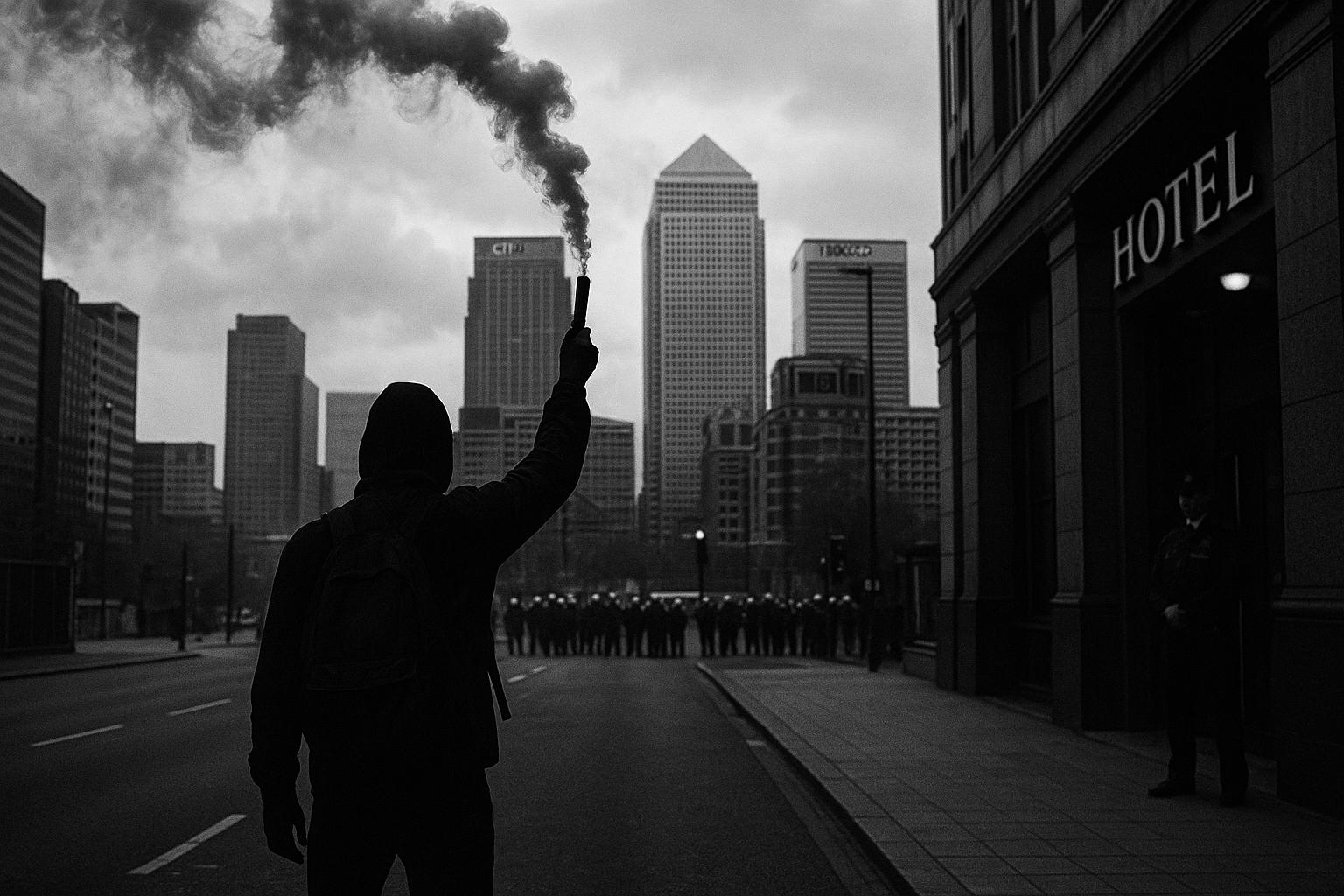Lee Anderson, the Reform UK MP for Ashfield, launched a blistering attack on Prime Minister Sir Keir Starmer in an interview with the Express, calling him "evil" and warning that those who speak out will be punished. Speaking to the Express’s investigations editor at Canary Wharf, Mr Anderson said: "This Keir Starmer, in my opinion, is evil. If you speak out, he'll put you in prison," and accused the Prime Minister of putting “anybody above the best interests of the British people.” The comments came as the Britannia International Hotel in the financial district has been thrust into the centre of a heated local dispute after asylum seekers were moved into the building. (According to the original interview, the arrival of a coach-load of mainly young men in the early hours of August 14 helped trigger the unrest.)
Protest activity around the hotel has been volatile. Local demonstrators — including a group described as predominantly women and children — staged a peaceful rally that was later disrupted by masked individuals who set off flares, according to contemporaneous reporting. Police officers from the Metropolitan Police attended and monitored the demonstrations, working with Tower Hamlets Council to try to keep events peaceful and to protect hotel staff and occupants. Witnesses and local reporting said some protesters jeered occupants and staff and that security personnel assisted the early-morning arrivals, creating a charged atmosphere in the normally quiet Canary Wharf precinct.
Mr Anderson framed the demonstrations as a response to public safety fears, saying people were "rightfully concerned about their daughters" and alleging that asylum seekers were responsible for a range of violent offences. He also repeated a cost figure — telling the Express it costs £41,000 a year to house a migrant in the UK — and warned that placing temporary accommodation in affluent areas would harm the local community and drive up crime. Independent analysis supports the broad trajectory of the financial figure he cited: an IPPR analysis, reported by The Independent, found that the average annual cost of housing and supporting a person seeking asylum rose from around £17,000 in 2019/20 to roughly £41,000 in 2023/24, a rise analysts linked largely to the greater use of hotel accommodation and slow processing times.
Mr Anderson’s intervention comes from a position of national prominence but also controversy. According to the BBC’s profile, he has been Ashfield’s MP since December 2019, defected to Reform UK in March 2024, and previously held roles and faced disciplinary action while a Conservative MP. His political trajectory — from coal miner and Citizens Advice worker to high‑profile media presence and outspoken Reform MP — helps explain why his comments attract attention beyond his constituency.
Police and council responses have emphasised public order and safeguarding. Evening Standard reporting said officers used powers under the Criminal Justice and Public Order Act to impose exclusion orders on specific individuals and carried out searches and arrests after attempts by some demonstrators to breach hotel fencing and after flares were lit. Sky News quoted Metropolitan Police spokespeople describing contingency plans to keep demonstrations peaceful and to protect residents and staff, while Tower Hamlets Council urged continued policing presence to reassure local businesses and the public.
The events at Canary Wharf are part of a wider national pattern of friction over the Home Office’s use of hotels for asylum accommodation. In Essex, the Bell Hotel in Epping was the scene of particularly volatile clashes following an allegation that an asylum seeker attempted to kiss a 14‑year‑old; that incident prompted a unanimous vote by Epping Forest District Council urging the Government to close the hotel. Sky News reported multiple arrests, officer injuries and a legal challenge by the council to halt the hotel’s use, underlining how local tensions over placement decisions have spilled into sustained, sometimes violent public disorder.
Government and local authorities say they are attempting to restore order while addressing safeguarding concerns. Sky News reported Home Office statements about efforts to restore order and implement a failure‑to‑travel policy intended to manage transfers, and Tower Hamlets Council publicly called for safeguarding and clear policing arrangements. Reform UK figures and local campaigners, meanwhile, have continued to press for faster action on closures or relocations of specific sites, reflecting a political contest over both policy and public reassurance.
The insurgent rhetoric from figures such as Mr Anderson — "We need a change of government," he told the Express — sits alongside data and official warnings that the current asylum accommodation system is under strain. Independent research and think‑tank analysis point to rising costs driven by hotel use and delays in processing claims, while police and councils warn of the resource pressures and community tensions that follow from ad hoc placements. The competing narratives — between those emphasising immediate local safety concerns and those urging measured, system‑wide reform — are likely to shape the debate in the coming weeks as ministers, local authorities and courts consider both security and the practical problems of accommodating people seeking sanctuary.
📌 Reference Map:
##Reference Map:
- Paragraph 1 – [1], [5], [3]
- Paragraph 2 – [1], [3], [4], [5]
- Paragraph 3 – [1], [6]
- Paragraph 4 – [2]
- Paragraph 5 – [4], [3]
- Paragraph 6 – [7], [3]
- Paragraph 7 – [3], [5], [7]
- Paragraph 8 – [1], [6], [3]
Source: Noah Wire Services
